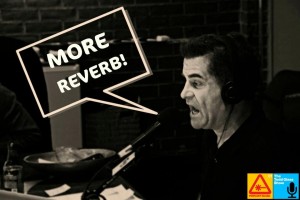 So this week we’re talking about the Todd Glass Show! The Todd Glass Show is hosted, suitably, by Todd Glass, with a rotating cycle of guests, guest hosts, bits, and in-show audience members. It’s fabulous, get used to it.
So this week we’re talking about the Todd Glass Show! The Todd Glass Show is hosted, suitably, by Todd Glass, with a rotating cycle of guests, guest hosts, bits, and in-show audience members. It’s fabulous, get used to it.
First off, Todd is an exceptional character. A great comic, with an individual style, styling and a real power of personality. Before the podcast, his presence on a show would make my eyes light up; just because of his energy, his excitement, his willingness to go deep or to get silly. He is, it seems, custom built to podcast. The repeated bits, self-reference, and the bonhomie his show possesses make it really an almost perfected form of the medium. Todd will persist with trying to work out a sketch for a half an hour, only to suddenly abandon it and talk about politics. Or go from attempting to sing an Englebert Humperdink song to a conversation about ‘Toddlers and Tiaras.’ This free form aesthetic encourages the participants to dance around topics, whilst the tendency of the podcast to go over two hours long means that the podcast just really works. And this is in no small part down to Todd Glass.
It’s clearly a very ambitious show, with Todd an equally ambitious host. He wants to cover the issues that stick in his craw, but at the same time be really entertaining and really funny. There is a desperation to not lose his guests and in studio audience that really shows through in his approach. The prefacing and encouragement for their contributions means that there is a constant group dynamic. And to his credit he rarely loses anybody through conversation, much as it often puts the guest into the position of re-explaining to him what he means. This makes for a quite unique podcast, as the outside audience listened to Todd and various cast members re-explain ideas in either more informative or more thorough ways. As such the debates develop far quicker, and far better, than one might expect. Even when the shows do get a little bogged down in repetition, the guests are always funny enough to pull them out of it, and Todd has enough sense to realise it too. The episodes vary in tone both within and without the episode, with some of the episodes being discussion focused, and others more improv oriented. Most of the episodes with Rory Scovel for example, take a fairly light hearted tone, whereas episodes with Paul F. Tompkins venture more into serious topics explored seriously. Todd’s mastery of both splitting up and interweaving these two almost conflicting elements of conversation is very much an art in and of itself, and really makes the show something extra. Being able to break from a daft bit where he’s pretending to be angry at random members of the in-show audience, to a bit where he tries to understand people who are essentially mean, to trying to understand peoples approaches gay rights is a real skill, and one that he’s quickly developing. Even only 30 odd episodes in, we can see Todd honing the craft and making the show more and more what he wants it to be.
Quite a few things have changed since the early episodes. They used to have a much more emphasised ‘weed culture,’ which meant that a lot of the after-show episodes (before which all the cast would smoke a large amount) would descend into near incomprehensibility, but be so frustrating close to brilliant that made it almost annoying at times. This could be due to my aversion to the culture, but it actually just reflects the exact reasons I’m averse. Namely: it was funnier when they weren’t all high; for me, you just need that little bit more self reflection and thought before your expression to add those uniquely clever moments the cast so often provide. But luckily this seems to be an aspect they’ve certainly reduced if not removed. Of course, I could just not have listened to it, but I do really love the show, and Todd Glass, so it’s pretty tough to just ignore his content. Another of the changes recently is a problem that Todd admitted to on the show, simply that a few too many of the bits ended up with the guests simply shouting at one another. Whilst this was entertaining most of the time, it is an angle which works better the less often it’s used, and it did give off that feeling of a slight failure of imagination. This has as much come to an end because of the recent guests, who have been those to whom shouting isn’t a predisposition. A Paul F. or an Anthony Jeselnik or a Jen Kirkman offer something different in terms of style, and often take the set-ups Todd offers in directions he isn’t expecting, which makes him laugh as much as the audience. And it is as much his laughter as anyone else’s that really bring the show it’s sense of self, by really encouraging our sense of simpatico with Todd, because it’s just great to hear him really really love something, particularly since this will then cause him to explain why the joke is funny, which is pretty hilarious too.
The podcast really revels in an analysis and reference to itself as well, and this comes directly from Todd’s personal style. His love of to taking apart whichever improvised sketch they are doing is almost exclusively beneficial to the sketch, and thus to the show as as result. This ability to not just be able to perform variations on bits and each time make it funnier and funnier is a real boon to the show. Rather than having internal doubts and debates about where a thing is going, or where an idea is coming from, Todd vocalises what he wants and is able to engineer or garner the style or sensibility he wants in the sketch. It also adds to a real kind of green room type feel. As if the show is an earhole into a group of comedians trying to make each other laugh after a comedy show, and as a mildly creepy voyeur type person, I find this a delight. To me, this is exactly how a podcast should feel. A conglomeration of entertaining and interesting people, who are as invested in one another as the podcast listeners are in them. Meaning the conversations develop in both an honest and intriguing way. One could suggest that Todd could do a show on his own, trying to explain as much to himself as the audience how he feels about ideas, but this would take away so much of the podcasts vivacity and essentially Todd’s reasons to continue with the venture. The guests add a genuine sense of joy and humour to the show and are all but invaluable. So far these guests are mostly people from around the LA comedy scene, with occasional ‘outsiders’ such as Geoff Tate, Demetri Martin or Henry Phillips. Personally I’m hoping for a return of Pepitone as soon as possible, just because he and Todd share a mentality. They have a real admiration for the old school of production and presentation, contrasted with a real love of constantly doing and disassembling bits, and really keep the conversation fresh and hilarious. A great guest might well be a really top level improviser, such as a Matt Besser or a Sean Conroy for example, since they too have a great love of discussion as much as an ability to slip in and out of bits easily and quickly. But who am I to tell the show what to do, Todd has hardly made many mis-steps up til now.
Todd has also been smart in the people he has surrounded himself with. The guest hosts, a cycle of Daniel Kinno, Bobby Miyamoto and Mike Koman, all help the comedy along. Either helping Todd talk things out, making additional jokes on the end of bits, or simply adding to the atmosphere, they prove a vital part of the comedy of the show. Blake Wexler’s presence, both on mike and off, is also great. His occasional, often furious, contributions to the show, usually near the end, add another recurring bit to the showl. And through his Nerdist affiliations he has the regular producers of the network, Katie and Chris, who both add to the show through cleaning it up and making it flow. All these composite parts would seem minor if removed, but their presence really buoys the show, and it wouldn’t be near the same or anywhere as good without them. And the jingles, boy howdy the jingles. The presence Lynn Shore’s jingles, both ironically and for laughs of their own, adds to that sense of individuality podcasts need to be memorable and worthwhile nowadays. Seriously, go listen already.
The Todd Glass Show is on iTunes, or over at http://www.nerdist.com/podcast/the-todd-glass-show/. Most of the guests and guest hosts are on twitter and findable as the first results under their names. Todd Glass also has a Twitter, which is @ToddGlass.


